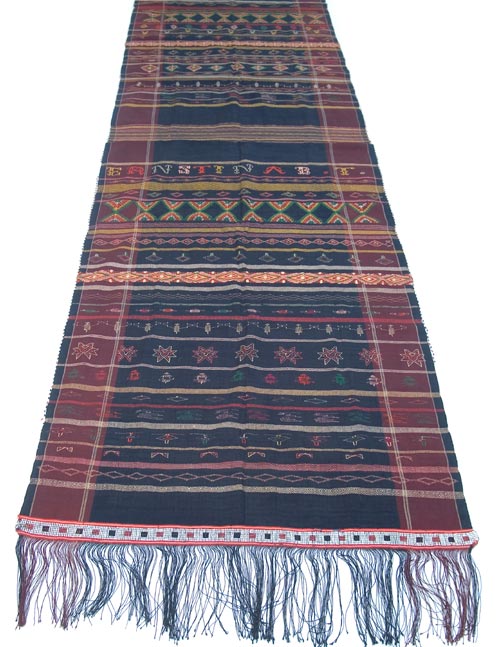
|
| home | site map | bibliographies | country | forum | links | studies | what's new | photogalleries | about us | |
|
 |
||
|
these images
are © and may not be reproduced without the express permission of Pamela
A Cross and Vera Tobing |
click on main photo enlargement to go to Vera Tobing collection photogallery - click on any thumbnails to go to further photo enlargements |
This fine ulos sadum was woven by Ernestina br.Hutagalung at the end of the first decade of the twentieth century before her marriage when she was living in the Silindung valley in the village of Huta Harean, one of the villages of the marga (clan) Hutagalung near Tarutung, North Tapanuli, North Sumatra. The sadum measures 218 x 70 cm excluding the fringes. Ernestina subsequently gave the sadum to her fourth child and second daughter, Oloan, just after her marriage. Ernestina told Oloan that she wove the sadum herself when she was a young girl or namarbaju. Namarbaju - between 14-18 years of age, immediately preceding marriage - was a common age for Batak girls to weaver at that time.
This sadum can be seen in 1972 being worn (detail) by Oloan at the funeral of her father, Ernestina's husband, Theodorik L Tobing. It can be seen again when Oloan wore it at the Mangongkal Holi Nai Horja ceremony (moving and reburying of the bones of Nai Horja, Oloan's grandmother, Theodorik's mother) in July 1982. Oloan has said that she does not know why she chose to wear her mother's sadum on that day. She subsequently gave the sadum to her niece, Vera, to help her with her business 'Vera's Ulos' which Vera ran in the 1980s and 1990s.

The central panel of deep blue and the side borders of a deep brownish maroon red are very probably of natural dyes - indigo and morinda citrofolia respectively. Ernestina's name 'Ernestina BT' (Ernestina Boru Tagalung) can be seen on the sadum. The name has probably been embroidered on the textile and the characters read backwards on the face of the sadum - although, from a distance, the sadum is double faced. Ernestina probably marked the letters and embroidered from the back of the textile. Ernestina was taught to read and write at a missionary school. Her father, Elkana Hutagalung, was himself educated by missionaries and trained to be a teacher - guru zending - of the Huria Kristen Batak Protestan (HKBP) Church. The HKBP was the first Christian church established in the Batak lands and was founded by the Rhenish missonary, Ludwig Nommensen who was active in the Toba Batak area during the second half of the 19th century.
ulos in the Vera Tobing collection
photographed by Mari Pro Foto Studio, Jawa Barat Depok |
click
on main photo enlargement to go to Vera Tobing collection photogallery
- click on any thumbnails to go to further photo enlargements
|
Both Pamela and Maria are very grateful indeed for the encouragement and advice which they have received from Sandra Niessen, a leading expert on the Batak and their textiles. See an autobiography and Batak references for more information about Sandra and her publications.
|
| home
|
site map | bibliographies
| country | forum |
links | studies
|
what's new
| photogalleries | about
us | |
|
Copyright © 2012 Pamela A Cross. The contents of this site, including all images and text, are for personal, educational, non-commercial use only and may not be reproduced in any form without the express permission of Pamela A Cross. |
|
If
you have any comments
on the tribaltextiles.info website please send them to us. If you have
any general tribal textile comments or questions go to the tribaltextiles.info/community
forum to share your thoughts and questions with an international
community of enthusiasts. |
this
page last updated
11 June, 2020
|